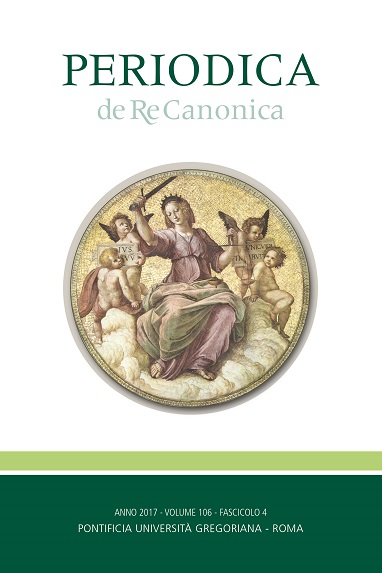Volume 111 - Issue 4
- Home
- Research and Publications
- Periodicals
- Periodica de Re Canonica
- Issues
- 2022
- Volume 111 - Issue 4

PERIODICA RE CANONICA -FOURTH ISSUE 2022
Issue 111/4 (2022) of the magazine Periodica de re canonica, quarterly published by the Faculty of Canon Law of the Pontifical Gregorian University, is now available.
Ulrich Rhode, S.J., Competentias quasdam: a motu proprio for decentralisation, 527-558
Abstract: The m.p. Competentias quasdam of 11 February 2022 wants to realize a “healthy decentralization” in the Church. Its publication is probably connected to the project of a reform of the Roman Curia which has been realized through the ap. const. Praedicate Evangelium. The actual impact of the new motu proprio is, however, quite limited. This becomes clear when it is compared to the list of all the affairs which require some sort of involvement of the Apostolic See. From this list, which certainly comprises more than one hundred items, the m.p. has withdrawn only one single item, the need of a confirmation for a decree of dismissal of a religious. In order to realize a decentralization which is able to really change the role of the Apostolic See, a much more extensive project would be necessary.
Keywords: decentralization; Roman Curia; dismissal of religious.
Davide Salvatori, Bonum coniugum: an end of marriage or an essential element of marriage, or an end and an essential element of marriage? Reflections on some logical-systematic difficulties in Rotal jurisprudence and a proposal for a unitary reading of the quaestio, 559-585
Abstract: The Tribunal of the Roman Rota understands the bonum coniugum from a twofold perspective: psychic incapacities (cf. can. 1095, 2°-3°) and simulation (cf. can. 1101 §2). Since jurisprudence recognizes a unity of meaning regarding the content of the bonum coniugum, which can be understood as a ius and an obligatio (cf. can. 1095, 2°), as an onus (cf. can. 1095, 3°), and as an elementum essentiale (cf. can. 1101 §2), and since this position is considered unanimous among Rotal judges, it seems appropriate to say that Rotal jurisprudence has “always” understood the bonum coniugum as an essential element. However, the mens of the Commission for the codification of canon law regarding can. 1055 §1 and certain Rotal jurisprudence have affirmed that the bonum coniugum is an end of marriage, but not an essential element of it. Moreover, the latter has also been identified as a secondary end. This second jurisprudential position faces some logical difficulties: how it is possible to assume an end and how it is possible to exclude an end? While the second difficulty has been solved using the distinction between finis operis and finis operantis, the first appears to remain unsolved in jurisprudence. Furthermore, the Magisterium dealt with the bonum coniugum both as an end (John Paul II) and as an essential element (Benedict XVI and Francis). The central thesis supported in this study is that the difficulties raised, in reality, seem to be apparent, due to the rigid position of the perspective assumed. If, on the other hand, the question is understood in a holistic sense, it may be said that the doctrine on the bonum coniugum has reached, at present, a definitive structuring: the bonum coniugum can now be considered both as an end and as an essential element of marriage, and the content of which would be identified with the secondary end. This does not seem different from the theological-canonical system that developed around the bonum prolis, since it has always been considered both as a (primary) end as well as an essential element.
Keywords: bonum coniugum; essential elements and ends of marriage.
Michele Munno, Reciprocity between faith and the sacrament of confirmation: considerations on the document of the International Theological Commission, 587-619
Abstract: What level of faith is required for the sacrament of confirmation? What is the effect of the sacrament of confirmation on the confirmed’s faith? The article examines these questions in the light of the document of the International Theological Commission “The reciprocity between faith and sacraments in the sacramental economy” and of the canonical norms.
Keywords: reciprocity faith sacraments; faith; confirmation.
Matteo Visioli, Theology and canon law: from shared crisis towards new perspectives of relationship. Twenty years after the decree Novo Codice, 621-647
Abstract: Twenty years after the introduction of the “Theology of Canon Law” among the academic disciplines prescribed by the decree Novo Codice, an awareness of an internal crisis has emereged within each of these disciplines: on the one hand, Church law has not succeeded, despite its efforts, in freeing itself from a profound anti-juridical sentiment that condemns it to remain confined within the dismaying categories of its ordered principle; on the other hand, theology seems to be characterised by a certain irrelevance, noting that the life of the Church is articulated apart from the arguments offered by the critical sense of the faith. The perspective of this article is to sketch a relationship between theology and law that does not start from the claim of a positive foundation of its own but rather from the concrete form that the relationship between believers takes with respect to the credibility or authenticity of the Gospel.
Keywords: theology of canon law; Novo Codice; canon law studies; crisis.
Matthias Ambros, The study of canon law twenty years after the promulgation of the decree Novo Codice, 649-669
Abstract: In commemoration of the twentieth anniversary of the promulgation of the Decree Novo Codice of the Congregation for Catholic Education, this article takes a closer look at the norms regarding the study of canon law, both in terms of its content and structure and its institutional aspects, taking into account the historical development of the Holy See’s norms regarding ecclesiastical studies. The article shows both the lines of continuity and, at the same time, the outlines of subsequent development.
Keywords: canon law studies; Veritatis gaudium, Novo Codice, Sapientia christiana, Novis postulatis; dispensation from academic title.
Johannes Fürnkranz, Dissolution of unconsummated non-sacramental marriage, 671-698